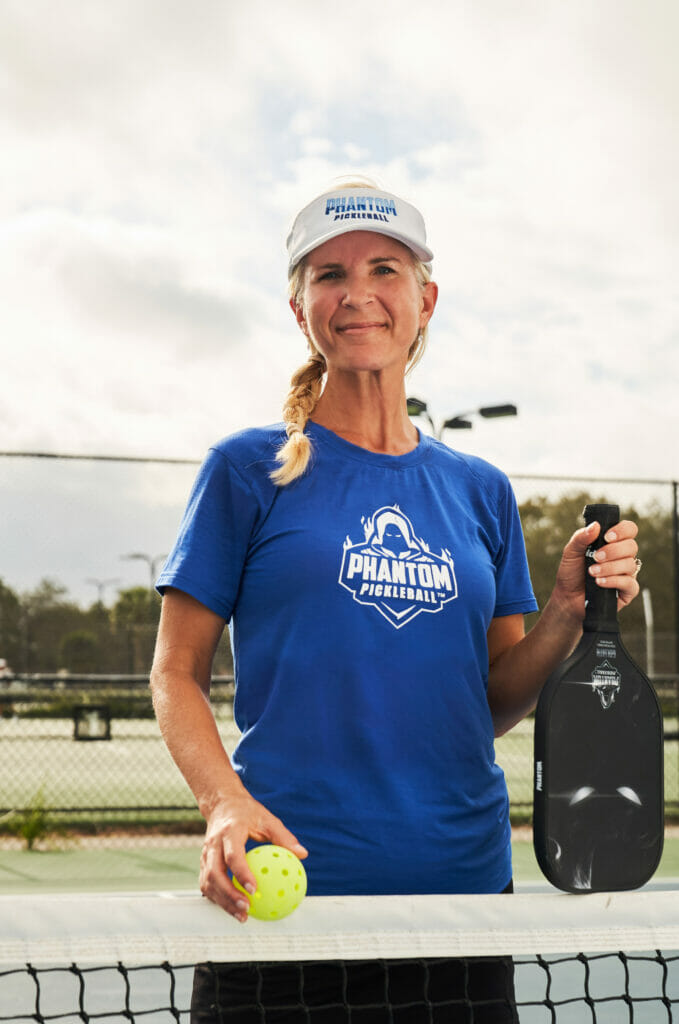Pick Up a Paddle: The Pickleball Revolution is Alive in Lakeland
By Rj Walters
Photography by Dan Austin
Newbies and veterans agree that pickleball is a blend of ping pong, tennis and badminton. But how many people do you know who are changing their work schedules, and even careers, to make space to play more tennis? How many investors are pushing full throttle to build the next ping pong megaplex? How many retirees are devoting their energy and time to training badminton players?
This is not a deep dive into the origin and rules of a game that was contrived on a whim by a congressman and businessman in Washington state in 1965; it is an acknowledgment that a cultural movement is taking place, local fans and players are multiplying by the day, and that the growth of pickleball is explosive and exciting, yet also introduces dilemmas related to the number of places in Lakeland available to play a sport that was mostly regarded as an activity for seniors a decade ago.
Google pickleball and you’ll find out that the name of the game either comes from the term “pickle boat” in the sport crew or in honor of a family dog named Pickles, but you’ll also learn about Major League Pickleball—which boasts teams owned by global celebrities like Tom Brady, Heidi Klum and Lebron James—and that an estimated 36 million people played the sport in the past 12 months, making it America’s fastest growing sport.
In Lakeland there are currently pickleball courts at Woodlake Park, Kelly Recreational Complex, Lake Parker Park, Simpson Community Center and Grasslands (exclusively for members), and as you will read, Lone Palm Golf Club is slated to open a members-only 14-court complex this spring.
Bob Donahay, Director of Parks and Recreation for the City of Lakeland, recalls a moment about five years ago when his department’s deputy director Pam Page showed him a magazine highlighting pickleball, declaring, “I want to build this in Lakeland.”
The growth of the sport, especially among traditional “non athletes” and the younger population, make it popular lunch table talk from school cafeterias to executive level gatherings.
One of the most endearing aspects of the game is its accessibility and inclusivity, and one way to appreciate the phenomenon is to understand the wide range of characters and backgrounds that seemingly tie neatly together on a 44 feet by 20 feet court.
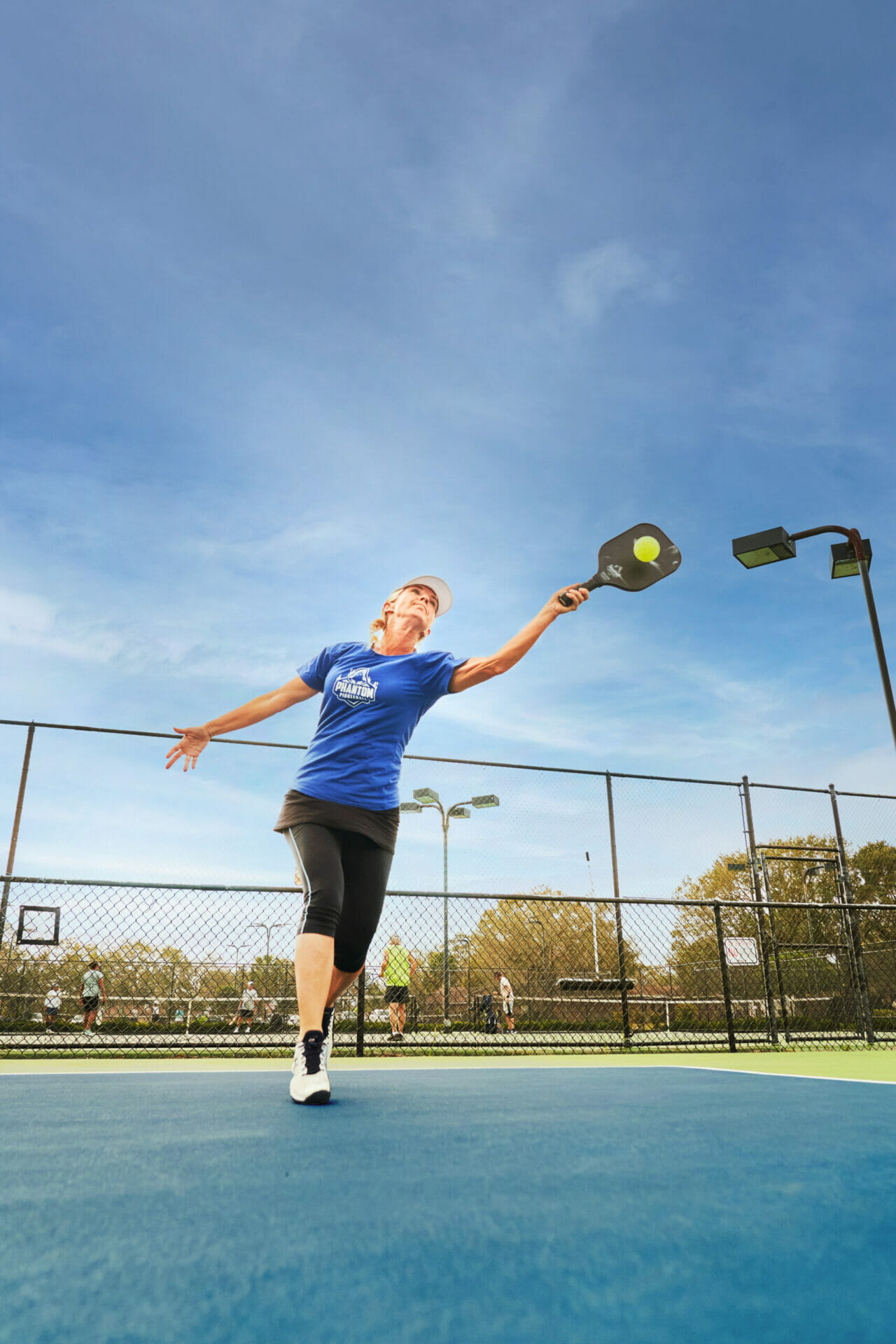
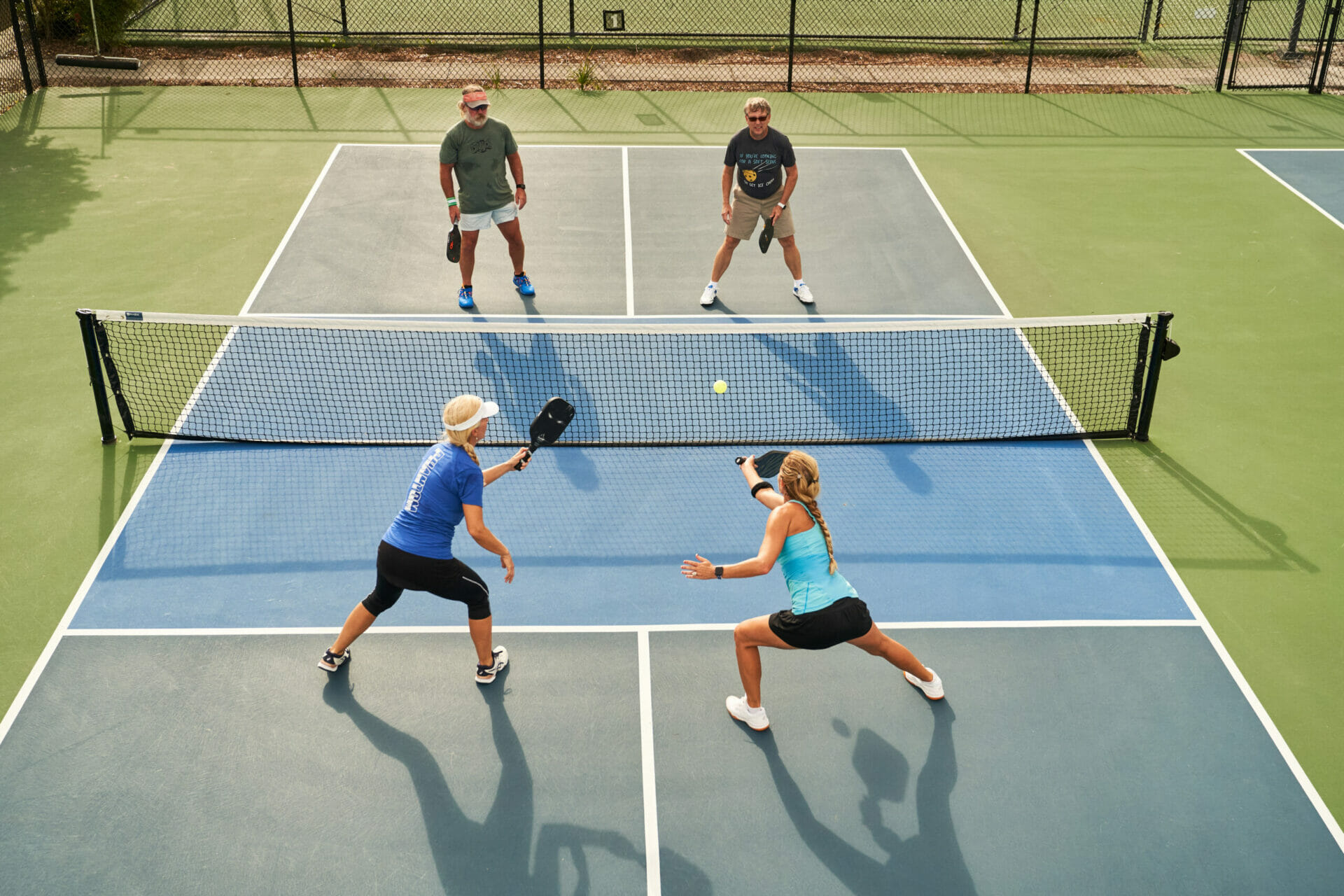
The Accidental
Addict
Kendra Schwada offered to dog sit for a friend while she and her husband, Paul, were on an extended stay in Estes Park, Colo. in 2021.
When she opened the door to her friend’s home, Kendra saw an odd shaped paddle hanging on the wall. Her friend explained it was for a sport called pickleball, and she offered to let Kendra borrow her paddles while she was out of town.
Players at the nearby pickleball courts were very friendly and willing to show Schwada the ropes, and before long the 47-year old was back in Lakeland making pickleball playing friends, finding a doubles partner—roughly 90 percent of pickleball games are played as doubles—and entering tournaments.
She played softball and volleyball at Olivet Nazarene University in the late 90s, but then didn’t play any sports for almost two decades as she focused on coaching her daughters and attending their games. Now she plays pickleball every chance she gets, and she even opted to shift careers to have a more flexible schedule that allows for her to stoke the flames of her newfound passion.
“It has changed my life,” Schwada said. “I’ve made tons of relationships in the community, and since I was new (to Lakeland), I didn’t have hardly any. My best local friend is my playing partner, and it’s just been wonderful in every way.”
She may not have played sports for nearly 20 years, but her competitive drive never disappeared. Schwada and her playing partner, Lakelander Tiffany Kitchens Cook, won the first ever tournament they entered, and in December 2022 the duo finished second in their division at the Hertz National Championship in Orlando.
She calls herself fierce on the court and friendly off it. One fellow pickleballer took note of her love for the sport when he visited Lake Parker last year. He happened to be an owner of Phantom Pickleball, based out of Davie, Fla., and he was so impressed with Schwada that he asked her to become a sponsored player, meaning she dons their apparel and plays with their gear while also offering feedback on the equipment. It was a great match for Schwada because Phantom is an up-and-coming company who supports the Special Olympics—something Kendra and her husband have an affinity for.

The OG
In Lakeland, many pickleballers know of the 250+ member GroupMe messaging thread devoted to playing at the Woodlake pickleball courts. David Bailey remembers a time when he was one of just four people on those messages, a space for he and his Woodlake tennis buddies to casually set up pickleball games.
Bailey was a dedicated tennis player for nearly three decades, but health challenges—including overcoming cancer and two back surgeries—took their toll.
A stranger introduced him and a few friends to the sport at Woodlake, and he quickly found it was less physically demanding than tennis and a cool way to stay active with friends.
He took such a liking to the sport that he earned his International Pickleball Teaching Professional Association (IPTPA) certification years ago, and still today the 63-year-old retiree hosts 5-10 training sessions per week for local players, which include kids as young as 11 and players of all skill levels.
Local pickleball players will find that Bailey has been an encouragement to many new players over the years—Schwada included—and he is a great person to talk to understand the true nuances of the sport.
“There’s a lot of strategy involved in pickleball,” he said. “The more experienced players kind of know how to place ’em, they’re looking a few moves ahead, while the (inexperienced) are more about right now, here’s a ball and I’m going to hit it.”
He said much of a person’s success in the sport is predicated on finding ways to force their opponent into making mistakes, and that’s why it is not always the stronger, faster athletes who win.
Both Bailey and Schwada said they have enjoyed seeing local college students pick up the sport, and their energy and passion has helped make it a cross-generational experience in Lakeland.
“It’s the only sport where everyone can play,” Bailey said. “Probably the oldest guy who plays out [at Woodlake] is 80…and there can be a 15-year-old and they can actually play with each other.”
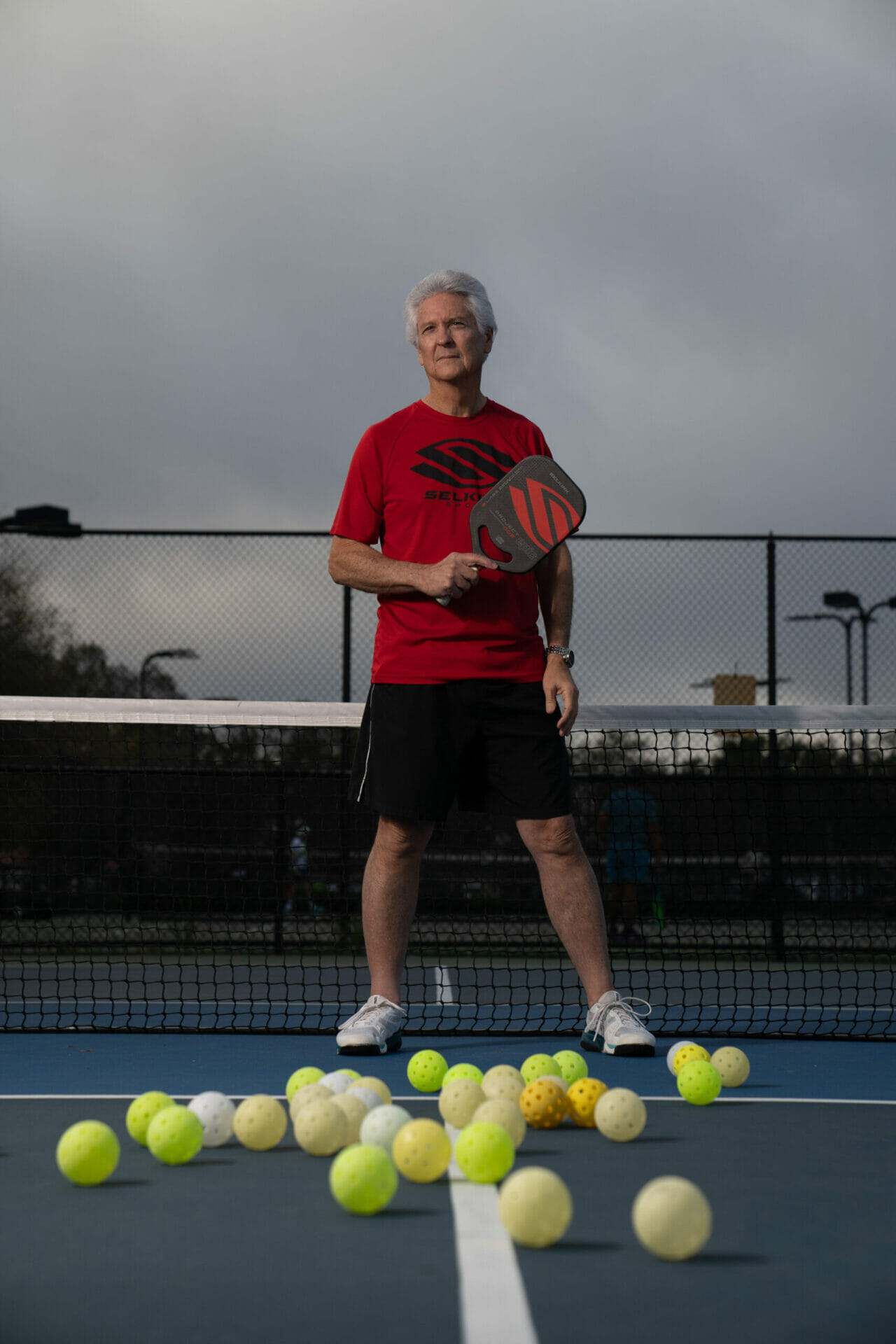
The Chemist
If Schwada represents the rejuvenated athlete and Bailey represents lifelong athletes who have fallen in love with pickleball, Trish Jenkins stands tall for everyone who grew up in a sport-obsessed culture, but never really found their place.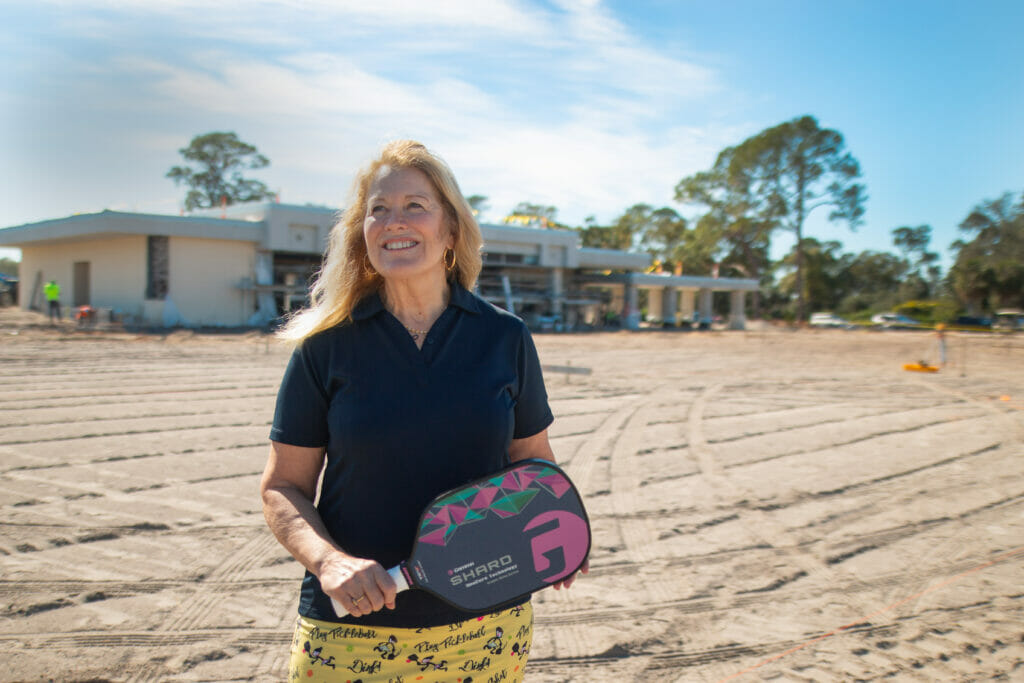
Jenkins was one of eight siblings, and admittedly she was the least athletic in her family. Several of her sisters became physical education teachers, another was a semi-professional basketball player, and she, well she was a career chemist who once took a half-credit tennis course in college.
But the 67-year-old who is married to former Publix chairman and CEO Howard Jenkins, stumbled into pickleball less than two years ago at a mobile home park in Naples, and soon after she was hooked on a sport that she calls “an equalizer” because it is inexpensive to play and creates social interaction among all demographics.
“You bring your skill to the court and you socialize,” she said. “I have met people on the court who design skyscrapers in New York City, and I have met people on the court who dig ditches for graves. It doesn’t matter—we’re all out there, and it’s really fun to hear these stories and these life experiences.”
The pickleball community touched her so deeply that within months of learning the sport she proposed a plan to build Lakeland’s first private pickleball club. She and family and friends went on a whirlwind tour of some of the largest and most lauded pickleball complexes in the country as a research project of sorts. This May, a pickleball complex with 14 courts, pro shop, locker rooms, sports bar and restaurant will open at Lone Palm Golf Club. Her father-in-law and Publix founder George Jenkins founded the club in 1964, and she and Howard are part owners. Patrons at the restaurant will even be able to watch the action on the courts on their own devices via closed-circuit technology.
She sees the venture as a step toward a new chapter for the club, noting traditionally Lone Palm has been a place where guys come and golf and talk business while their wives or significant others might enjoy lunch or play a game of bridge or cards.
“I think it’s more of an investment in people than it is material. It’s a good family building mechanism,” she said. “The club is getting a little aged, and now we’re gonna be able to bring in families in a much more cohesive manner.”
At the beginning, only current Lone Palm Golf Club members will have access to the new facilities, but later this year the general public will have the opportunity to become members of the pickleball club.
She beams with joy when she talks about Nate Jager, a pickleball trainer and coach from St. Pete who is moving his family to Lakeland so he can become the club pro at Lone Palm. Jenkins said he has connections with some of the highest ranking pros in the U.S. and he will bring top-notch clinics and training sessions to Lakeland. And Schwada—whose passionate pursuit of sharing the sport with others mirrors Jenkins’ in many ways—is slated to be the club’s assistant pro.
Jenkins is also hopeful about hosting small tournaments and getting a variety of youth programs off the ground in the long run.
Schwada said it will be a huge win for the local pickleball scene if Lone Palm can run high quality tournaments, but it will take a lot of attention to detail to match some of the best Florida has to offer.
Full Court Press
Donahay said it’s phenomenal Lone Palm is “going big time” with such a huge investment in the sport. Meanwhile he and the city are hard at work on current and future investment in helping build capacity for players—both high-level veterans and casual hobbyists.
The city is installing lighting for the six courts at Woodlake Park and also hopes to convert three more tennis courts at Kelly Rec into eight new pickleball courts in the next 6-8 months.
In addition, Donahay and his staff have master plans approved for a 101-acre park that will include pickleball facilities in rapidly-developing southwest Lakeland at Medulla and Pipkin roads. That park is tentatively scheduled to be complete in 2030, but Donahay would like to find financial means to speed up that timeline.
Still, some pickleball enthusiasts hope for more options quicker because it is becoming common at peak times to have to wait at least half an hour just to get in a match.
Schwada and Bailey are amongst a contingent of players who have voiced their concern to the city, and who think the most simple solution would be to convert the rest of Woodlake’s tennis courts to pickleball courts. Bailey said that could turn that space into a 30-court “pickleplex” that could at least provide some of the amenities and opportunities like more preeminent complexes people travel to cities like Daytona, Bradenton and Fort Myers to enjoy.
Donahay said “pickleball is truly a phenomenal sport” that he and the city have a strong affinity for, but it is also the city’s role to balance out the needs of tennis players and take into consideration all budgetary impacts of shifting athletic interests.
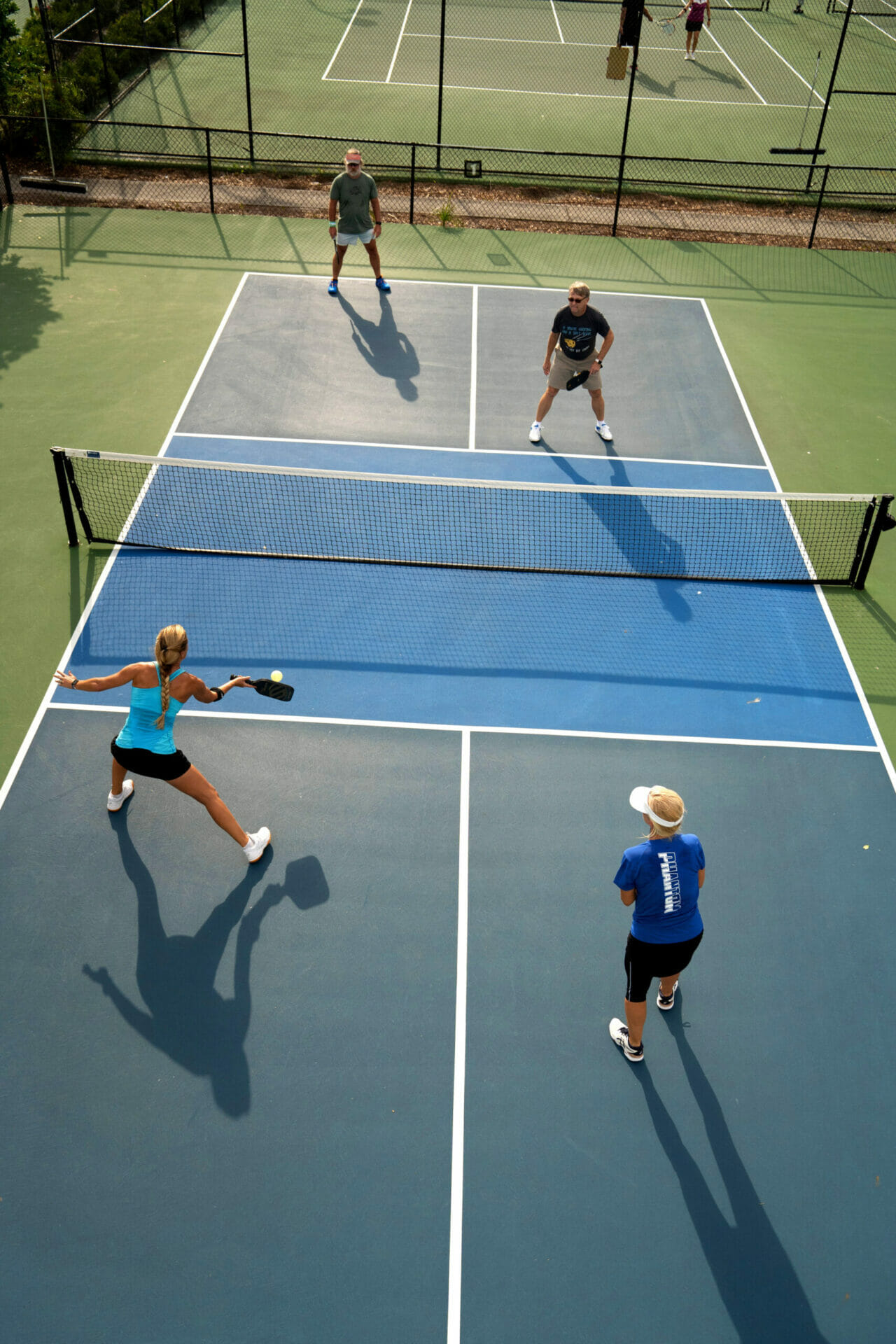
“Tennis actually pays us money; we get money from each one of the high schools and colleges that book time on our tennis courts, and we have USGA tournaments,” he said. “I tried to explain that if I take out some more tennis courts or convert more tennis courts to pickleball, then we start getting into cutting our local high schools, and I don’t wanna do that. What did tennis players in the tennis programs do to get the shorthand?”
Bailey says with a large enough venue in Lakeland he believes there is money to be made off of sanctioned pickleball tournaments, and he also sees value in the economic impact of being known as a place people want to travel to enjoy this burgeoning sport.
One solution Donahay has pitched to city commissioners in the past to help fund projects that meet the wants and needs of Lakelander is a Municipal Services Benefits Utility tax, something the county government has leveraged in the past.
The truth is the pickleball craze has come to Lakeland, and it’s playing out on portable nets in neighborhood cul de sacs and converted tennis courts at gorgeous parks.
What comes next?
Find three friends and grab some paddles while it all plays out—it might just change your life.

